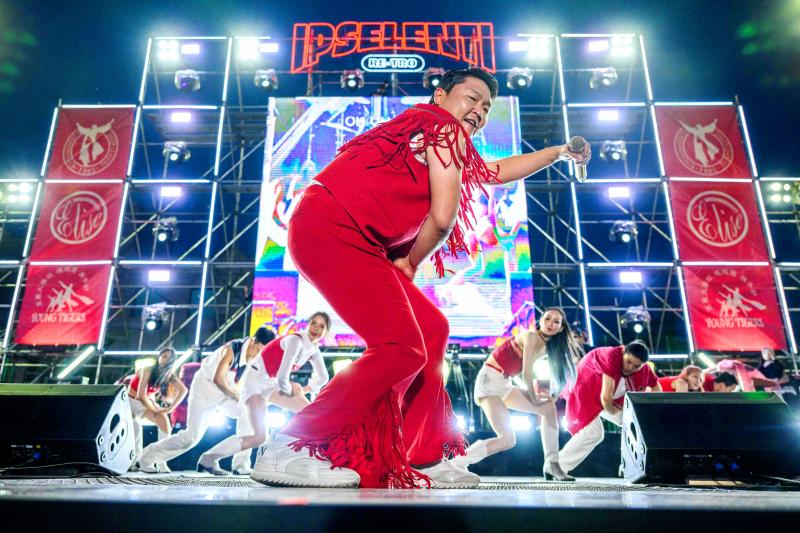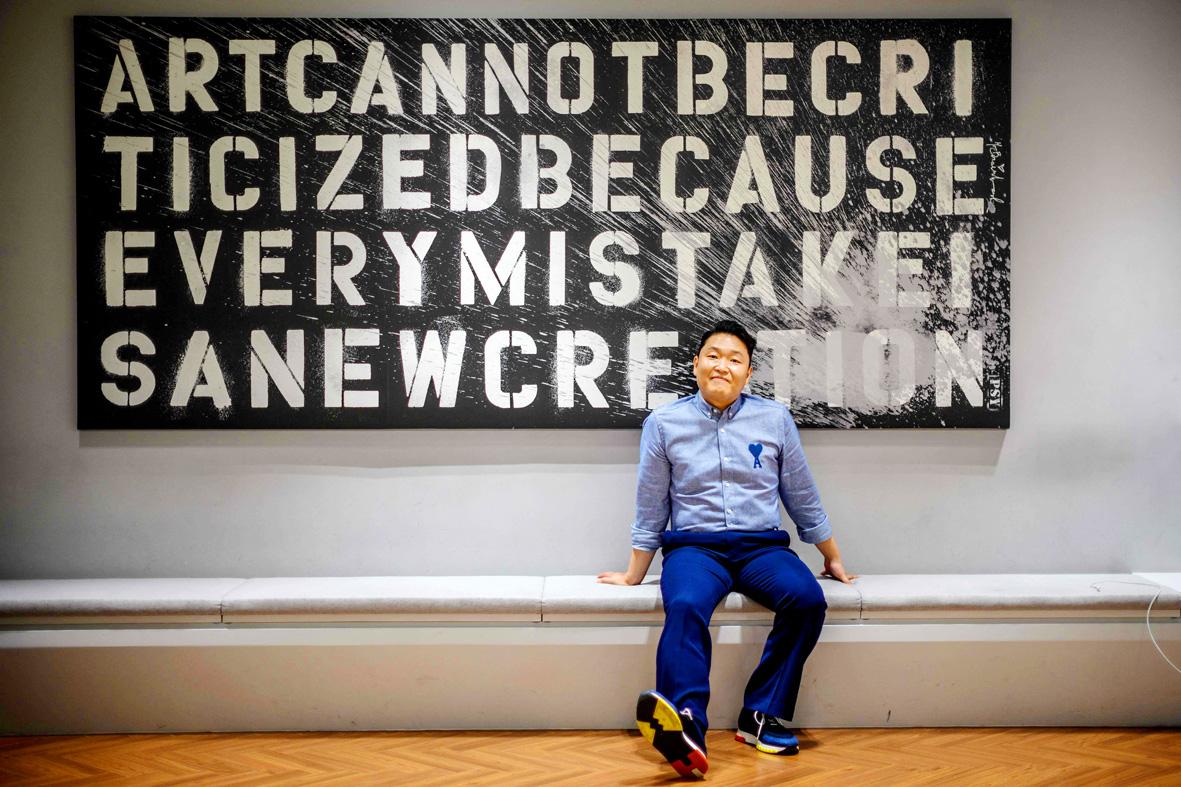Ten years after “Gangnam Style” became a global phenomenon, South Korean rapper Psy is living his best life — proud of his “greatest trophy” and free from the pressure of repeating that unprecedented success.
Uploaded to YouTube on July 15, 2012, the song’s wacky music video became a runaway megahit, with its trademark horse-riding dance spawning thousands of imitations, spoofs and spinoffs.
It was the first YouTube video to reach one billion views, and with it Psy attained what K-pop acts before him could not: global recognition.

Photo: AFP
At the peak of the song’s popularity, he was everywhere — sharing the stage with Madonna, leading a flash mob in front of the Eiffel Tower, and performing before then US president Barack Obama.
But the success of Gangnam Style was a double-edged sword — with fame came pressure to deliver another huge hit. Psy once described it as one of the most difficult periods of his life.
Things became “heavier and harder because... every time I (had) to have that kind of strong song,” Psy said last week at his company’s headquarters in Gangnam — the posh Seoul district he poked fun at in the track.

Photo: AFP
“I had a huge dependency (on) the song... But you know, it’s 10 years ago, so right now I’m really free.”
Gangnam Style transformed not only Psy’s career but the music industry too, demonstrating how an artist not performing in a dominant language such as English could reach international audiences through the Internet.
It also prompted a change in how music charts were compiled, making Billboard take YouTube views and streams into account.
K-pop acts “are very huge on YouTube, they are getting a lot of views,” Psy said. “If Billboard didn’t change, it (wouldn’t) be that easy,” the 44-year-old added.
Psy’s groundbreaking role has been acknowledged by some of the biggest names in K-pop.
“He’s always someone I was grateful for,” Suga, a member of hugely popular group BTS, said in a video last month.
“With Gangnam Style, he paved the way for K-pop in the United States... We were able to follow his footsteps with ease.”
A FRONTMAN LIKE FREDDIE MERCURY
Psy, whose real name is Park Jae-sang, was a superstar in South Korea well before Gangnam Style.
He cites Queen as his earliest inspiration — while in middle school, he watched a video of the British band’s famous 1986 concert at Wembley.
“I thought: I want to be a frontman like him (Freddie Mercury),” Psy said. “At that moment, I was not that good at music, not that good a singer... I was just a funny dancer.”
While attending university in the US in the late 1990s, he was exposed to what many have described as one of the golden ages of hip-hop, including the music of rappers Tupac Shakur and The Notorious B.I.G.
“I literally heard hip-hop every day on the radio,” Psy said. “I thought: Oh, if I cannot sing that well, I gotta rap. Then I can be the frontman.”
Debuting in 2001, he quickly made a name for himself with humorous and explosive stage performances and won multiple awards.
Unusually controversial for a Korean pop star, several of his earlier songs and music videos were given adult ratings because of what state censors deemed bad language.
‘HOW LUCKY I AM’
Since the explosive success of Gangnam Style, Psy has put out three albums.
The latest, Psy 9th, was released in April by P NATION — the record label and artist agency he founded in 2019.
Psy insists he is far from done, dividing his time between his own music and concerts and working with P NATION acts. And Gangnam Style remains a huge source of pride.
“It’s the biggest and greatest trophy of my life,” Psy said. “When I do [a] show, it is my strongest weapon.”
This was demonstrated at a performance at Korea University in Seoul last week, when a heaving crowd sang along to every word during a high-energy set that included songs from his first album more than two decades ago, as well as his latest one.
The fact that the young audience knows all the words to songs that were released before many of them were even born is not lost on Psy.
“These days, [I say to myself]: ‘Wow, dude, you are very popular. They love you!’ How lucky I am as an artist. I’m happier than ever these days.”

June 23 to June 29 After capturing the walled city of Hsinchu on June 22, 1895, the Japanese hoped to quickly push south and seize control of Taiwan’s entire west coast — but their advance was stalled for more than a month. Not only did local Hakka fighters continue to cause them headaches, resistance forces even attempted to retake the city three times. “We had planned to occupy Anping (Tainan) and Takao (Kaohsiung) as soon as possible, but ever since we took Hsinchu, nearby bandits proclaiming to be ‘righteous people’ (義民) have been destroying train tracks and electrical cables, and gathering in villages

Dr. Y. Tony Yang, Associate Dean of Health Policy and Population Science at George Washington University, argued last week in a piece for the Taipei Times about former president Ma Ying-jeou (馬英九) leading a student delegation to the People’s Republic of China (PRC) that, “The real question is not whether Ma’s visit helps or hurts Taiwan — it is why Taiwan lacks a sophisticated, multi-track approach to one of the most complex geopolitical relationships in the world” (“Ma’s Visit, DPP’s Blind Spot,” June 18, page 8). Yang contends that the Democratic Progressive Party (DPP) has a blind spot: “By treating any

This year will go down in the history books. Taiwan faces enormous turmoil and uncertainty in the coming months. Which political parties are in a good position to handle big changes? All of the main parties are beset with challenges. Taking stock, this column examined the Taiwan People’s Party (TPP) (“Huang Kuo-chang’s choking the life out of the TPP,” May 28, page 12), the Democratic Progressive Party (DPP) (“Challenges amid choppy waters for the DPP,” June 14, page 12) and the Chinese Nationalist Party (KMT) (“KMT struggles to seize opportunities as ‘interesting times’ loom,” June 20, page 11). Times like these can

Swooping low over the banks of a Nile River tributary, an aid flight run by retired American military officers released a stream of food-stuffed sacks over a town emptied by fighting in South Sudan, a country wracked by conflict. Last week’s air drop was the latest in a controversial development — private contracting firms led by former US intelligence officers and military veterans delivering aid to some of the world’s deadliest conflict zones, in operations organized with governments that are combatants in the conflicts. The moves are roiling the global aid community, which warns of a more militarized, politicized and profit-seeking trend